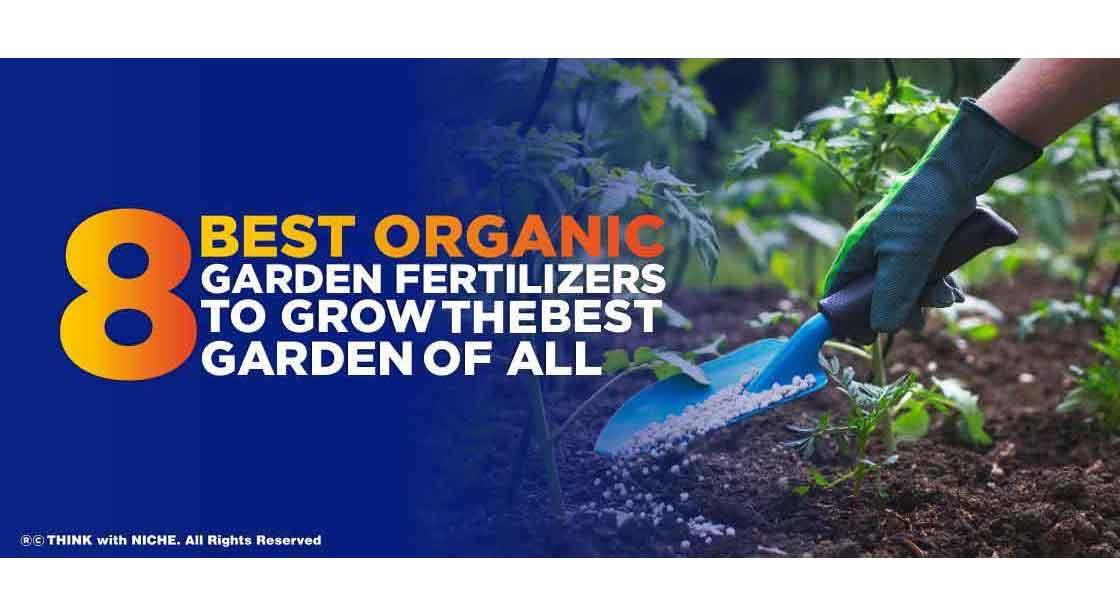8 Best Organic Garden Fertilizers To Grow the Best Garden

Blog Post
To get the best results from your new organic garden, you need to ensure the soil is properly conditioned. You have to eat like a plant, so make sure your vegetables get plenty of fresh nutrients. Healthy soil helps strong and productive plants to grow. Chemical soil treatment can not only penetrate food but also harm beneficial bacteria, bugs, and other microorganisms in the soil. You no longer need to purchase costly fertilizers. With these organically built fertilizers, constructed from rubbish or stuff from around the house, your garden will thrive. #ThinkWithNiche
Organic gardening is as popular as ever, and the practices we use are vital to our health and the planet's long-term viability. You can use a variety of organic fertilizers in your garden or with your potting soil. Some of these fertilizers can be created or collected at home with a typical kitchen or waste items. Here are our top eight organic fertilizers for a range of applications. So, all you garden enthusiasts, get ready to create the greatest garden of all time.
Coffee Grounds Fertilizer
Coffee is one of the most common beverages consumed in the morning. Every day, most of us have coffee grounds leftover. So, instead of throwing it out, you'll use those grinds, which are high in nitrogen and aid to raise the soil's acidity. This fertilizer is especially beneficial for roses, hydrangeas, and magnolias, but you can also use it to help your vegetables thrive. This is also a very straightforward procedure. Simply work the coffee grounds into the soil around the base of your plants, and the coffee will instantly energize them.
Tea Fertilizer
Gardeners have been combining this basic tea fertilizer to deliver nutrients to plants for generations, and it's simple to produce. Fill a jar halfway with water and soak the strained remaining black tea leaves for three days. After three days, strain the tea and dilute it by half with water. This can be done in a two-liter bottle. Simply add to the soil surrounding your plants.
Manure
Manure is produced by a variety of animals, including cows, horses, and chickens. Although each sort of manure is high in nitrogen and other nutrients, it must be used with caution. Because raw manure is highly acidic and may contain more nutrients than your plants require, too much of it might cause your plants to burn. Composted manure is the finest option. You can use more of it to boost your soil's water retention without putting your plants at risk because it is less nutrient-dense and acidic. You won't have to wait long because manure quickly decomposes into an odorless soil supplement.
Epsom Salt Fertilizer
You may also make a nice fertilizer by mixing Epsom salt with water if you prefer something a little simpler. Epsom salt is available at a variety of stores and is quite inexpensive. It's also high in magnesium and sulfur, and it's especially beneficial to roses and tomatoes. This is a fertilizer that will not let you down. You can't go wrong with this one. To feed your indoor and outdoor plants, simply dissolve a tablespoon of salt in a bowl of water.
Banana Peel Fertilizer
Bananas are high in potassium, as we all know. They're also high in calcium and phosphorus, making them ideal for nourishing floral plants, as well as fruit trees and plants. Simply put banana peels in the soil near the roots of your plants and let them disintegrate. You can also freeze overripe bananas and bury them beside your plants. Alternatively, you can produce a spray by soaking banana peels in water for three days and then spraying your plants or seedlings to supply the nutrients they require. This is a fantastic formula for the indoor plant as well.
Onion Peel Fertilizer
Don't toss out the onion peels; instead, use them to make organic potassium-rich fertilizer for all your indoor and outdoor plants. It will improve their disease resistance, growth, stem strength, and productivity if they use it. Calcium, Iron, Magnesium, and Copper will all be abundant in this onion peel fertilizer. Soak 2-3 handfuls or a bowl of onion skins for the next 24 hours in 1-liter water. Strain the water into a jar because it will be colored and thick. It's time to make your onion skin tea fertilizer. Feed it to your plants 3-4 times a month.
Egg Shell Fertilizer
Eggshells are another item that you undoubtedly have a lot of during the week and usually discard. Calcium is abundant in the shells, which aids cellular growth in your plants. Tomato blossom end rot and other garden disasters can be caused by calcium-deficient soil. This eggshell fertilizer will assist in putting a stop to it. Simply smash used eggshells and bury them in the ground. Alternatively, 20 eggshells and a gallon of water can be used to generate a spray. Boil the shells for a few minutes in water, then set aside overnight. Strain the shells and pour the water into a spray bottle to use on your soil.
Wooden Ash Fertilizer
Plants benefit from wood ash because it contains calcium carbonate and potassium. All you must do now is pour the ash into the garden bed and massage it in. It's best to do this shortly before planting so you don't risk knocking over or damaging your plants while massaging the ash into the soil.
Conclusion
Plants, like humans, require a variety of nutrients to thrive. While store-bought chemical fertilizers often contain all these nutrients, we may supply healthy nutrients to our plants without the use of harsh chemicals by manufacturing them ourselves, and most of them can be manufactured with items we already have on hand and will likely discard. So, without throwing anything away, check out some of the techniques that have been compiled to assist us in protecting our families and the environment.
You May Like
EDITOR’S CHOICE












